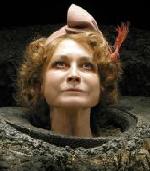SITE GUIDE
SEARCH
REVIEWS
REVIEW ARCHIVES
ADVERTISING AT CURTAINUP
FEATURES
NEWS
Etcetera and
Short Term Listings
LISTINGS
Broadway
Off-Broadway
NYC Restaurants
BOOKS and CDs
OTHER PLACES
Berkshires
London
California
New Jersey
DC
Philadelphia
Elsewhere
QUOTES
TKTS
PLAYWRIGHTS' ALBUMS
LETTERS TO EDITOR
FILM
LINKS
MISCELLANEOUS
Free Updates
Masthead
Writing for Us
A CurtainUp Review
Happy Days
By Les Gutman
|
This will have been a happy day! ---Winnie |

Joyce Aaron
(Photo: Carol Rosegg) |
Life is a series of steps from womb to grave. At a certain age -- we could call it late middle age or early old age -- we comprehend more clearly that each day brings us one pace closer to the latter so we keep ourselves busy recalling the past and occupying the present, as a diversion from that awareness of what the future ultimately holds, if nothing else.
Beckett's central character, Winnie (Joyce Aaron), is at that age. Buried to the waist in a mound of earth and thus largely deprived of her present tense while vividly reminded of where she is headed, Winnie nonetheless finds a fragile cheerfulness. She nourishes her soul with a combination of fond recollection and amuses herself with the routine of her daily rituals: brushing her teeth, donning her hat and so on. Her large bag is still accessible and holds a treasure trove of miscellania, though by the second act she's buried up to her neck and can't reach it. But she perseveres. She's lonely, and her mole-like husband, Willie (Ron Faber) -- he can still crawl around -- doesn't pay her much mind. But life, vacant as it seems, lumbers on.
Beckett's rich and enriching play captures the human spirit eloquently. Yet the path to its potency is a perilous one. The role of Winnie is a demanding one for the actor; it's not surprising that many of the greats have been drawn to its challenge. Ditto for the director, who must find a way of maintaining an audience's attention through roughly an hour and a half of stasis -- the play is essentially a monologue with diminishing opportunities for theatricality.
This production, which returns the play to the venue in which it had its world premiere thirty-one years ago (almost to the day), reunites three significant figures of the experimental theater era from which the play arises. Ms. Aaron and Mr. Faber were both associated with the ground-breaking Open Theater which director Joseph Chaiken founded. Those critics who regard our current theater as moribund will no doubt see the analogy between this production and the play it celebrates.
Ms. Aaron gives us a performance that is invigorating. In Mr. Chaiken's careful hands, her Winnie is lively and entertaining, upbeat but with chords of despair. Given to the occasional affectations of grandeur, she is nonetheless seen as a fairly simple woman, chattering endlessly in the hope at least some of her words will filter through to her dear Willie. With rare exception, he seems to have lost any interest he ever had -- it's not clear he ever really had that much -- solitarily burrowing about or taking a rest with the newspaper until, dressed to the nines, he takes one last stab at visiting. Exaggeration is a real risk in staging Happy Days, and Chaiken has found quite a fine balance, engaging us without overstating the upside and yet not boring us to death either. As the entertainment subsides, the import activates our minds.
Katherine Ross's costumes convey just the right impressions, and Beverly Emmons unfussy lighting doesn't intrude. Riccardo Hernandez, a set designer who has done brilliant work elsewhere, falls short here on several counts. His mound doesn't quite convey the sense of immobility that is required and it (and Chaiken's blocking) fails to overcome the difficult obstacle of keeping Willie obscure but intermittently in view, especially from close house right, seats that are best avoided if possible.
For those whose nostalgia comes from a different direction, it should be noted that Beckett's play bears no relation to the television show that introduced us to The Fonz. It's more apt to recall the song "Happy Days Are Here Again". And yes it is.
LINKS TO REVIEWS OF OTHER BECKETT (AND RELATED) PLAYS
Krapp's Last Tape
Happy Days (another NY production)
Texts for Nothing
...and then you go on
The Complete Lost Works of Samuel Beckett As Found In An Envelope (partially burned) In A Dustbin In Paris Labeled "Never to be performed. Never. Ever. EVER! Or I'll Sue! I'LL SUE FROM THE GRAVE!"
| Happy Days by Samuel Beckett Directed by Joseph Chaiken starring Joyce Aaron with Ron Faber Set Design: Riccardo Hernandez Lighting Design: Beverly Emmons Costume Design: Katherine Ross Running time: 1 hour, 40 minutes with one intermission Cherry Lane Theatre, 38 Commerce Street (Bedford/Barrow) Telephone: (212) 239-6200 TUES - SAT @8, SAT @2, SUN @3; $45 Opening September 29, open run Reviewed by Les Gutman based on 9/27/02 performance> |

6,500 Comparative Phrases including 800 Shakespearean Metaphors by CurtainUp's editor.
Click image to buy.
Go here for details and larger image.



